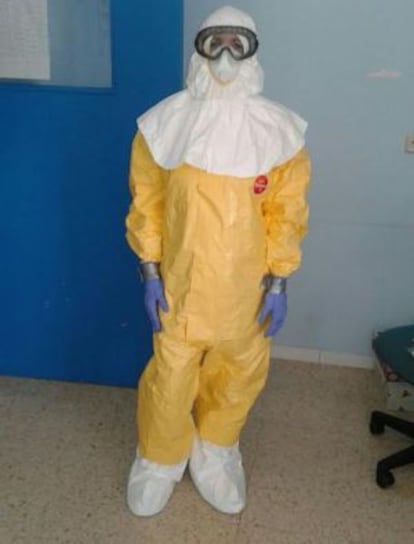Hospital workers: “Ebola suits unsafe”
Personnel at Carlos III show pictures of protective gloves attached to gown with duct tape


Personnel at the Madrid hospital where two Ebola patients were treated have reported that the protective suits used in their presence did not meet safety requirements.
The revelation follows news that a Spanish nursing assistant has become the first person to contract the highly infectious virus in Europe.
The woman was part of the team that treated Spanish missionary Manuel García Viejo, who died of the virus on September 26 at Madrid’s Carlos III-La Paz Hospital.
Hospital workers said that while regulations establish the need for Level 4 protective equipment, which includes a completely impermeable hazmat-style suit and a respirator, healthcare workers who treated the missionaries Miguel Pajares and Manuel García Viejo only had Level 2 protective garments.
Both men ultimately died in hospital after several days of experimental treatment.
Yolanda Fuentes, deputy director at the Carlos III and La Paz hospitals, denies any breach in safety measures.

“The suits meet all protocol requirements in terms of the protective measures needed for this disease,” she said.
But photographs sent in by hospital personnel show that the protective suit has no respirator and that the latex gloves are attached to the sleeves with duct tape.
These workers also report that there was a health risk involved in not evacuating the hospital when García Viejo was treated, and say that the waste generated inside both patients’ rooms was disposed of via the same elevator used by all hospital personnel.
Fuentes admitted that the protective suit had independently attached gloves, but insisted that “these met with safety protocols for Ebola.”
She also denied that waste was taken out in the hospital elevator. “That elevator was blocked for those patients,” she said. “Carlos III hospital is well equipped to treat all the cases we have seen.”
Meanwhile, the president of the General Nursing Council, Máximo González Jurado, told the news agency Europa Press that he has read a “very well-documented report” on the protocol used at hospitals that deal with Ebola cases. The study, drawn up by a healthcare professional, notes that while measures are “very safe from the viewpoint of public health, they present many problems from a labor viewpoint.”
González also criticized the deficient information relayed to the nurse community. “At no time did anyone ask for our opinion,” he added. “Something has failed, and this cannot be allowed. We will ask health authorities for an in-depth investigation, and failing that, we will take the necessary measures.”
Daniel Bernabéu, president of the physician union AMYTS, said he felt a “mixture of dismay and indignation” when he learned about the case. “Protocols have been observed and the circumstances in which the infection occurred must be investigated. Any contact entailed a risk that the government had to assume.”
Tu suscripción se está usando en otro dispositivo
¿Quieres añadir otro usuario a tu suscripción?
Si continúas leyendo en este dispositivo, no se podrá leer en el otro.
FlechaTu suscripción se está usando en otro dispositivo y solo puedes acceder a EL PAÍS desde un dispositivo a la vez.
Si quieres compartir tu cuenta, cambia tu suscripción a la modalidad Premium, así podrás añadir otro usuario. Cada uno accederá con su propia cuenta de email, lo que os permitirá personalizar vuestra experiencia en EL PAÍS.
¿Tienes una suscripción de empresa? Accede aquí para contratar más cuentas.
En el caso de no saber quién está usando tu cuenta, te recomendamos cambiar tu contraseña aquí.
Si decides continuar compartiendo tu cuenta, este mensaje se mostrará en tu dispositivo y en el de la otra persona que está usando tu cuenta de forma indefinida, afectando a tu experiencia de lectura. Puedes consultar aquí los términos y condiciones de la suscripción digital.








































